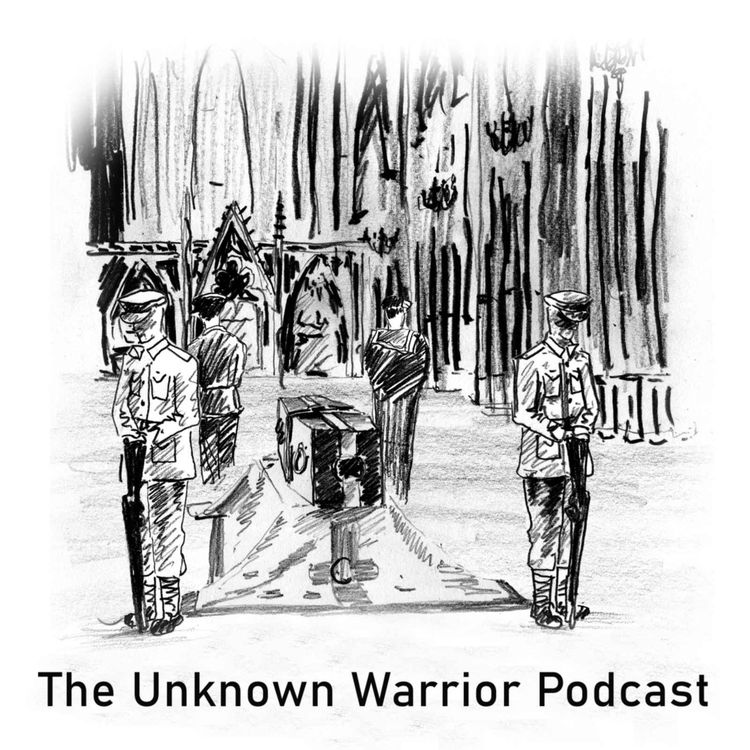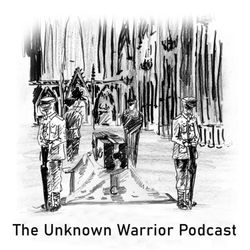Share

The Unknown Warrior Podcast
Known Unto God - The Missing of the First World War Part 2
Season 1, Ep. 15
•
Our latest episode is Part 2 of our fascinating chat with John Broom, author of Reported Missing in the Great War: 100 Years of Searching for the Truth. In this episode we explore the stories of missing soldiers Frank Mead and Gilbert Donnelly, and the harrowing impact that the gruesome work of body recovery had on the men working for the Directorate of Graves Registration and Enquiry. We also uncover the scandal behind the decision to scale back the work of the DGR&E by the British Government, and the long lasting impact that missing soldiers had on their families and communities right up to the present day.
More episodes
View all episodes

16. Among The Kings - The Play
40:46||Season 1, Ep. 16For our latest episode we speak to playwright Dan Gordon and actor Michael Condron about a new play called Among The Kings based on the latest research carried out by historian Mark Scott who we spoke to in previous episodes of the podcast. We explore the background to the play and how both Dan and Michael are reimagining and bringing to life characters critical to the Unknown Warrior story. This is remarkable project and hopefully one which we'll all be able to see performed very soon!
14. Known Unto God - The Missing of the First World War Part 1
33:32||Season 1, Ep. 14It is estimated that around half of the men killed in action serving with British and Commonwealth forces during the First World War remain unidentified. This vast army of unknowns was one of the key motivating factors behind the creation of the Unknown Warrior. In part one of a special two part podcast, historian and author John Broom explores the factors that led to such a vast number of unidentifiable casualties, and the extraordinary efforts that officials, organisations, and ordinary family members went to in order to discover what happened to their loved ones. We also uncover the darker side of this work, and how charlatans and chancers prayed on those desperate for news.
13. The Remarkable Work of the MOD War Detectives
28:36||Season 1, Ep. 13Throughout the podcast we've highlighted the remarkable work carried out by the men of the Directorate of Graves Registration and Enquiry one hundred years ago. But as the bodies of fallen servicemen continue to be discovered the vital work of identifying and burying these men continues. We're delighted to welcome onto our latest episode Nicola Nash from the Ministry of Defence Joint Casualty and Compassionate Centre Commemorations team - more commonly known as the War Detectives. We explore the remarkable detective work carried out by this small team attempting to identify and honour servicemen who have fallen on battlefields across the globe.
12. To Us They Were Our World - The British Widows of World War One
35:40||Season 1, Ep. 12For the majority of us interest in World War One is focused on the stories of the soldiers at the front. But what about the families left behind in Britain, and those for which the war brought a deep personal tragedy? In our latest episode we speak to author and historian Andrea Hetherington and uncover the story of those women left widows by the war. The societal pressures mourning widows faced, the deep financial consequences the loss of a main breadwinner could have, and also the very moving personal impact of the loss of a loved one killed a long way from his family and home.
11. The Tomb of the Unknown Soldier in France and Italy
29:35||Season 1, Ep. 11Throughout this podcast we have focused on the story of the British Unknown Warrior. But the idea to create a tomb to an unknown fallen servicemen has been taken up across the globe. In our latest podcast speak to academic and historian Laura Wittman about the creation of the Tomb of the Unknown Soldier in both France and Italy. We explore how each country had their own unique inspiration behind the idea of recovering the body of an unknown soldier to represent the fallen, how the soldier was chosen, and the impact this had on his fellow countrymen. Creating a symbol of national mourning, but also being utilised by a war weary population to help create a better country for those left behind.
10. In This Sign Conquer - The Role of Chaplains in the First World War
35:16||Season 1, Ep. 10Chaplains play a critical role in the story of the Unknown Warrior. From the Reverend David Railton who first conceived of the idea to bring an unknown soldier back from France, to the Reverend George Standing who joined the ambulance crew that drove the unselected unknown's away from St. Pol and into the night. But what was a chaplain's role at the front, and how important were they to the soldiers they served alongside? In this fascinating new episode we speak to academic and researcher Kathryn White and explore the work and role of the padre in the First World War.
9. The Name Beneath the Stone
25:03||Season 1, Ep. 9The story of the Unknown Warrior has fascinated generations with its mystery and intrigue. Author Robert Newcome is no exception, his own interest and research into the story led to the creation of his novel The Name Beneath the Stone: Secret of the Unknown Warrior. Although a work of fiction, the novel explores many parts of the story, whilst linking its mystery right up to the present day. In our latest episode we speak to Robert and explore his own interest in the story, the research process into the Unknown Warrior, and how his own personal connections have influenced his writing.
8. Recovery, Burial and Commemoration - The Work of the Commonwealth War Graves Commission
30:15||Season 1, Ep. 8The First World War created a unique situation for the recovery of the dead in war. For the first time the public demanded that the mass casualties received by a citizens army should be marked and respected. But how was this vast operation to be mounted, and how were the cemeteries in France and Belgium created? In our latest episode we are joined by Peter Francis from the Commonwealth War Graves Commission who discusses body recovery and burial, the organisation that made this huge task possible, and how bodies were identified both in the past and today.